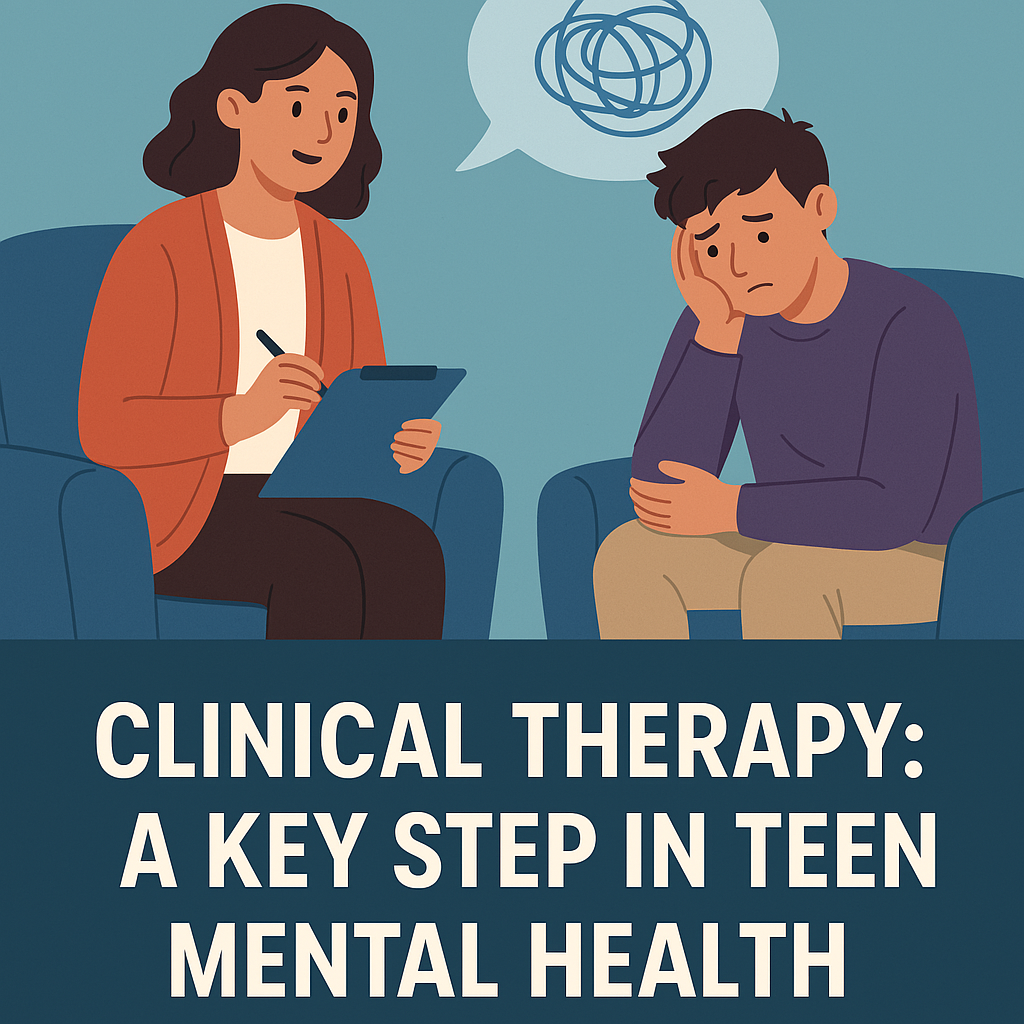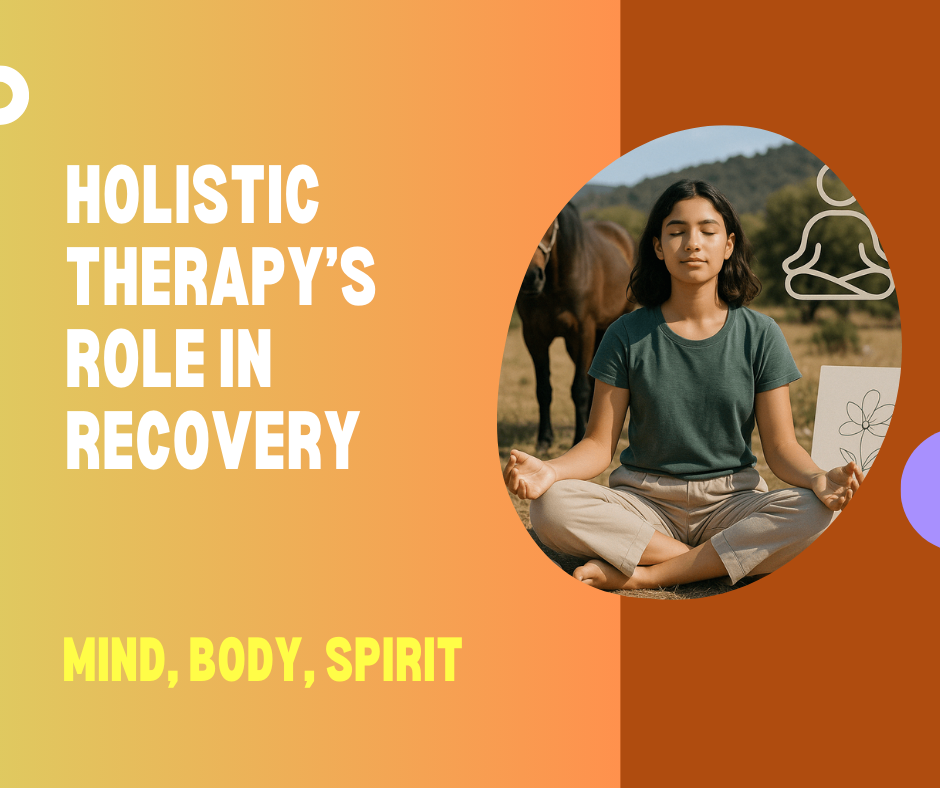
Clinical Therapy: A Key Step in Teen Mental Health

In a world where 31.9% of teens struggle with anxiety and 40% feel persistently hopeless (source), every conversation matters. Clinical therapy is the evidence-based lifeline that can transform these challenges into opportunities for lasting recovery. Recent studies show that nearly 1 in 4 teenagers will have encountered a traumatic event by age 16, underscoring why early intervention is crucial. Teen mental health needs immediate attention. Yet many teens don’t receive proper care. Clinical therapy offers a proven solution that’s often overlooked.
Understanding Clinical Therapy
Clinical therapy is a structured, professional approach to mental health treatment. It involves working with licensed mental health professionals who use specific, research-backed methods to address psychological challenges.
Unlike informal support, clinical therapy relies on structured, research-backed methods administered by licensed professionals to drive meaningful change. This makes it fundamentally different from advice-giving or casual conversations.
For teens, clinical therapy typically includes approaches like Cognitive Behavioral Therapy (CBT), which has been widely studied and proven effective for various teen mental health issues. These methods are tailored to adolescent development and specific challenges.
The Importance of Clinical Therapy in Teen Mental Health
Today’s teens face unprecedented pressures. Social media, academic stress, and social dynamics create a perfect storm for mental health challenges. And with 80% of school-age children with mental health diagnoses not receiving care, professional intervention is essential.
According to recent CDC data (August 2024), while some mental health indicators have improved, significant challenges remain – which clinical therapy can help address.
Clinical therapy offers several key advantages:
- Personalized treatment plans based on individual needs
- Professional assessment to identify underlying issues
- Structured approaches to building coping skills
- Safe space for processing difficult emotions
Early intervention through clinical therapy can reduce the severity of mental health problems by 50-60%. This improves long-term outcomes and prevents the development of unhealthy coping mechanisms.
Founded by Brian Carlisle, FNP-C, Horizon Recovery combines clinical expertise with a holistic approach to provide personalized care for teens facing mental health challenges.
Bridging the Gap: Perspectives for Both Parents and Teens
For Parents: Recognizing the Warning Signs
As a parent, you know your child better than anyone. Trust your instincts when you notice these potential indicators:
- Persistent mood changes that go beyond typical teenage mood swings
- Withdrawal from activities and friends they once enjoyed
- Significant changes in sleep patterns or appetite
- Declining school performance or sudden disinterest in academics
- Expressions of hopelessness, worthlessness, or suicidal thoughts
For Teens: What to Expect in Therapy
If you’re a teen considering therapy, know that it’s a safe space created just for you. Your therapist will:
- Keep your conversations confidential (with exceptions only for safety concerns)
- Listen without judgment or criticism
- Never force you to discuss topics you’re not ready to address
- Focus first on building trust and understanding your unique situation
- Work with you to develop strategies that feel right for your life
Open communication between parents and teens is vital. Create regular check-ins about emotional well-being, and normalize discussions about mental health. Parents should listen without judgment, while teens should feel empowered to express their needs.
Steps to Begin Your Clinical Therapy Journey
If you notice concerning patterns in yourself or your teen, consider these steps:
- Consult with your primary care physician for an initial assessment
- Research therapists who specialize in adolescent mental health
- Check your insurance coverage for mental health services
- Interview potential therapists about their approach and experience
- Prepare for the first appointment by noting concerns and questions
Finding the right therapist matters. Look for professionals with specific training in teen mental health at specialized treatment centers that offer comprehensive care.
Struggling with insurance verification or scheduling? Contact Horizon Recovery today. Our team can help navigate these logistical challenges and connect you with the right resources for your family’s needs.
For families concerned about cost, explore options like insurance coverage, sliding scale fees, or community mental health centers. Therapy without insurance typically costs $68-$250 per hour, but with insurance, copays may be just $20-$50.
To learn more about our expert team and comprehensive programs, visit our About Us page.
Debunking Common Misconceptions About Clinical Therapy
Myth: Therapy is only for severe mental illness.
Truth: Research shows that therapy benefits people facing a wide spectrum of challenges, from everyday stress and life transitions to more serious conditions. Many teens find therapy helpful for managing academic pressure, social anxiety, or family changes.
Myth: Needing therapy means you’re weak.
Truth: Studies consistently show that seeking help demonstrates self-awareness, courage, and a commitment to personal growth. The strongest people often recognize when they need support.
Myth: All therapy is the same.
Truth: Different therapeutic approaches target specific needs and personality types. From Cognitive Behavioral Therapy (CBT) for changing thought patterns to Dialectical Behavior Therapy (DBT) for emotional regulation, treatment can be tailored to your teen’s unique situation.
Myth: Therapy takes forever.
Truth: Many modern therapeutic approaches are time-limited and goal-focused. Research indicates that significant progress often occurs within 12-16 sessions, with many teens experiencing relief even sooner.
Myth: Parents will be blamed for their teen’s problems.
Truth: Contemporary therapy focuses on solutions rather than blame. Family therapy aims to strengthen relationships and improve communication, recognizing that mental health challenges affect the entire family system.
Embracing Clinical Therapy for a Healthier Future
Clinical therapy offers a proven path to better mental health for teens. With professional guidance, teens can develop coping skills, improve emotional regulation, and build resilience that lasts a lifetime.
If you notice concerning changes in yourself or your teen, take action. Early intervention dramatically improves outcomes and quality of life.
Remember that seeking help is a sign of strength, not weakness. Clinical therapy empowers teens with the resilience and skills needed for long-term recovery. Don’t wait until challenges escalate—take that crucial step today. Visit our Clinical Therapies page to learn how Horizon Recovery’s expert team can help your teen embrace a healthier, more balanced future.
More posts like this
.svg)
Guiding your teen’s path to mental clarity, sobriety, and a hopeful future.
For more information or to schedule a visit, please reach out to us today. Our empathetic and caring team is here to support you every step of the way.
.svg)
.avif)
.svg)
.svg)



